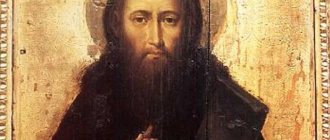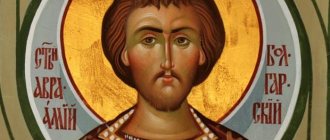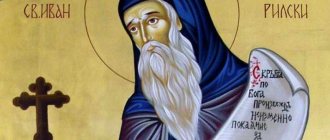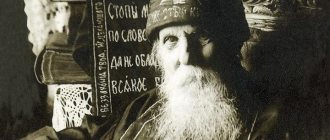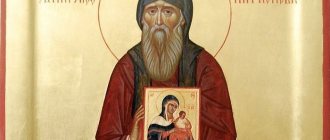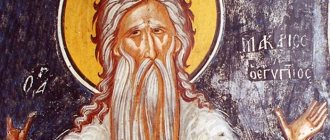Biography of Saint Vitaly
Vitaly of Alexandria was born around the 6th century. There is no exact biographical information about the saint. Information about him reached descendants in the form of an instructive parable.
The Monk Vitaly preached the word of God, was a humble old man and a zealous ascetic. The monk treated people who had fallen into sin mercifully and in every way turned them away from fornication.
Origin
Saint Vitaly was from Palestine. He took monastic vows in his youth and lived in the Serida monastery near the city of Gaza until he was sixty years old. The monk led a measured life, but ended his earthly journey with a feat in the city of Alexandria. Therefore, Christians revere him under the name of Alexandria.
Serving God
In his old age, the Monk Vitaly figured out how to serve God and people. He arrived in Alexandria to admonish women who made their living by fornication. The elder strived to work as a farm laborer, despite his advanced age. The monk kept one coin for food, and gave the rest of his earnings to sinners so that they would leave their sinful labor.
Vitaly spent his nights with harlots in a brothel: he came to each one’s room in turn and prayed. The elder's sermons awakened conscience and repentance in the city's harlots. But ordinary townspeople fell into doubt. They saw that the monk leaves the “priestesses of love” in the morning.
Gossip spread through the streets of Alexandria that the monk was a saint only in daylight. The old man teaches to behave decently, and every night he visits the abode of debauchery. Vitaly learned that he was being defamed. But it was easier for him to take an imperfect sin to heart than to talk about his own virtue.
In order not to fall into the real sin of vanity, the Monk Vitaly answered the townspeople that monks have weaknesses, like ordinary people. The harlots were also silent about the exploits of the elder. He prayed at night for the salvation of their souls. Some of the sinners found honest work, became nuns, or got married.
At Vitaly’s request, the women did not say why they reformed. One of the harlots once did not keep her promise and began to talk about the reverend monk. Convulsions prevented her from finishing the story. The woman began to scream and rage. After this, the other girls did not dare to break the agreement with the elder.
Demise
Murmurs grew in Alexandria. Vitaly fueled the rumors with humble answers. Passers-by spat at him and advised him to take one of the harlots as his wife. With feigned anger, the elder replied that the advisers should take a long road and take care of their own piety. The Lord will judge them, and everyone will get theirs.
Local residents reported to Patriarch John the Merciful about a lascivious preacher who was defaming the monastic robe. But the head of the Alexandrian church decided that the pious elder was being slandered by evil, loose tongues, and condemned the slanderers.
One day, in front of the doors of a brothel, the Monk Vitaly received a slap in the face from a young visitor. Everyone was ashamed of the “Lady Monk.” And the young man, despite his own depravity, also decided to teach the old man virtue. To the young man’s reproaches, Vitaly replied that a retaliatory blow awaited him, and all of Alexandria would be witnesses.
The monk's life was coming to an end. Vitaly left the brothel that warmly sheltered him, settled in a separate cell and prayed. He rested in humble prayer. On the day of the monk’s death, a demon appeared to the young libertine. Having hit the young man in the face, the unclean one said: “This is a blow for the monk Vitaly.”
After these words, the townsman began to have a fit, tearing off his clothes. He shouted in a voice that was not his own, and passers-by came running to the noise. A huge crowd, almost the whole of Alexandria, gathered around the demoniac. Waking up from the seizure, the young man looked around and remembered the elder’s prediction.
In repentance, the young fornicator went to look for Vitaly and found him lifeless. At the moment when the monk’s soul flew away, the demon appeared to the young man.
Vitaly could no longer accept repentance, but left an instruction for all Alexandrian men - not to condemn the Lord first. Only He is the One Righteous Judge. The words of instruction were written on parchment, which the elder held in his hand.
During the reign of Emperor Antoninus, who occupied the Roman throne in the middle of the 2nd century, a rich woman named Felicata lived in Rome. She had seven sons - Januarius, Felix, Philip, Silvanus, Alexander, Vitaly and Martial. She was born in 101 A.D. and with all her heart she accepted the faith of Christ from an early age, and, being devoted to the One God with all her soul, she raised her children in the fullness of Christian commandments and virtues. From an early age, boys attended services that were secretly held in Rome by the first Christians, were taught chants, reading the first church books, and took part in house services. The main thing that she cared about in caring for her children was not so much their earthly well-being, which the noble Roman woman had enough of, but the salvation of their eternal soul.
When the idolatrous priests noticed that Felicata did not make sacrifices to the pagan gods and did not bring her children to the temples to worship idols, they learned that she secretly professed the faith of Christ and, moreover, spread it, they went and reported to Emperor Antoninus. The emperor became angry and ordered the prefect Publius to take the saint and her children in order to force everyone to renounce the confession of Christ, worship idols and sacrifice to them.
Knowing that she would never return home, Saint Felicata and her sons, with their quick and common consent, gave away all their wealth and went to the prefect. At first, Publius tried to cajole the saint with promises and promises of a well-fed and even richer life, then he urged her to think about what kind of torment she and her children would be subjected to if they did not come to their senses and make sacrifices to the pagan gods. Saint Felicata remained adamant and only prayed to God that He would give her to the young men, of whom Saint Vitaly was one of the youngest, the strength not to leave the path of salvation. Then Publius began to beat the mother in front of the children, but even then she stood her ground. Then he turned to the children, starting with the eldest Januarius, then it was the turn of Felix and everyone else. The younger ones, Vitaly and Martial, watched as their older brothers resisted temptation. Then Januarius was severely beaten in front of his brothers, and everyone was sent to prison.
The prefect reported to the emperor about everything that had happened, and received instructions from him - to execute everyone, young and old, with the mother being the last. The young men were given to several judges, sophisticated in executioner cases, and they did their cruel work, each in their own way. Saint Felizata saw how her boys were dying, but she prayed for only one thing - that they would be steadfast and, having previously accepted the crown of martyrdom, would find the Kingdom of God. Following them, their holy mother appeared before the Lord. This happened around 164. After the execution, the saints' relics were taken by Christians and buried there, in Rome, where they now reside in the Church of Santa Susanna.
There is no special church-wide prayer to Saint Vitaly, so you can pray to him by saying the prayerful invocation of the saint whose name you bear: “Pray to God for me, holy servant of God Vitaly, as I diligently resort to you, a quick helper and prayer book for my soul.”
The meaning and veneration of the saint in Orthodoxy
Saint Vitalius of Alexandria is revered in the Orthodox, Greek and Catholic churches. According to legend, after the death of the saint, the harlots told about his life and his last exploit. Patriarch John of Alexandria ordered that Vitaly’s body be interred with honors.
According to the Orthodox menaion books, the memory of the reverend monk falls on the date of April 22.
The feat of Vitaly of Alexandria is an example of Christian humility. Every day he faced ridicule and reproaches, but continued to quietly pray and care for harlots. Without revealing his true thoughts in advance, the elder helped many women cleanse themselves of sin. The feat of Elder Vitaly shows believers how to defend a good cause without vanity.
Just as the residents of Alexandria made it a rule after the death of the elder not to judge anyone, so every believer must close his heart and mind to prejudice. One should not draw conclusions without knowing the true reasons for a person’s actions and thoughts.
St. Vitaly reminds Christians that it is easy to notice the sinfulness of others and not see the beam in one’s own eye. Patriarch John the Merciful knew this truth. Ordinary Christians should follow his example - not believe slander. If your neighbor has sinned, do not judge him and protect him from misinterpretations.
The Act of John the Merciful
And although the monk hid his feat, this does not justify those who condemned him or openly reviled him. But there was still a man in the city who did not condemn the saint. It was the Alexandrian Patriarch John the Merciful. When rumors about the behavior of Saint Vitaly reached him, John the Merciful refused to believe them and cited the example of Emperor Constantine the Great, who at the First Ecumenical Council, without reading, burned written denunciations against some bishops and priests, saying that it was not his business to judge clergy. The emperor also added that if he had seen with his own eyes a priest or monk with a harlot, he would have covered him with his own cloak so that no one would look.
Iconography
Features of the image of St. Vitaly:
- black monastic robe:
- there is a hood on the head;
- gray-bearded and gray-haired;
- with a scroll in his hands.
In some images the monk appears as a dark-haired elderly man.
Saint Vitaly was often depicted on waist-length icons. On an icon from the 19th century, the monk is depicted in full growth in the middle of his cell. To the right of the monk there is a table with an open book.
A more complex image of St. Vitaly also dates back to the 19th century. In the center is the monk in full growth, with his head uncovered and a long dark beard. His hands are folded in a respectful gesture.
The upper left corner is occupied by the icon of the Resurrection of Christ. To the right of the saint is the image of the Virgin Mary of Feodorov. In the center above the head of the monk is the face of Jesus Christ “Savior Not Made by Hands.”
The icons of Vitaly of Alexandria bear the signature “Holy Venerable Vitaly.” They are distinguished from the icons of another saint, Vitaly the Roman, who suffered for the faith along with his brothers and mother Filitsa in the year 164. In addition to the signature, the images of saints differ in iconography - the Roman martyr is always depicted as a young beardless youth.
Orthodox texts
Saint Vitaly is glorified with traditional short hymns. The monk is not widely known in the Orthodox Church, so a non-sedal chant was not composed in his honor.
Troparion
In you, father, we know that I was saved, even in the image:/ for you accepted the cross, you followed Christ,/ and you taught us to despise the flesh, for it passes away,/ to be diligent about the souls, things more immortal.// Likewise, the Angels will rejoice, Reverend Vitaly, your spirit.
Kontakion
Having armed yourself with divine purity of soul,/ and unceasing prayers/ as if you had firmly handed over a copy,/ you have broken through the demonic host./ Vitaly, our Father,// pray unceasingly for all of us.
Prayer
Oh, sacred head, reverent father, most blessed Abvo Vitaly, do not forget your poor to the end, but always remember us in holy and favorable prayers to God: remember your flock, e. You yourself have fallen, and do not forget to visit your children and pray for us, Holy Father, for your spiritual children, for you have boldness towards the Heavenly King: do not keep silent to the Lord for us, and do not despise us, who honor you with faith and love: remember us unworthy at the Throne Almighty, and do not cease praying for us to Christ God, for grace was given to you to pray for us. We do not think that you are dead: even though you have passed away from us in body, you remain alive even after death, do not depart from us in spirit, keeping us from the arrows of the enemy and all the delights of demons and the wiles of the devil, Our good fellow. Even though your relics are always visible before our eyes, your holy soul stands with the angelic hosts, with disembodied faces, with heavenly powers, at the throne of the Almighty, worthy of rejoicing Knowing that you are truly alive even after death, we bow down to you and We pray to you: pray for us to the Almighty God, for the benefit of our souls, and ask us time for repentance, so that we may pass from earth to Heaven without restraint, from bitter ordeals, demons of the princes of the air and from eternal misery May we be delivered, and may we be heirs of the Heavenly Kingdom with all the righteous, who from all eternity have pleased our Lord Jesus Christ: to Him belongs all glory, honor and worship, with His Father who is without beginning, and with His Most Holy and Good and Life-giving Spirit, now and forever, and to the ages of ages. Amen.
The meaning of the name Vitaly
The name Vitaly, like many others, came to us from ancient Rome, as a derivative of Vitalis, which means “vital” in Latin. This male name is found in the calendar of commemoration of saints in both the Catholic and Orthodox churches.
In medieval Rus' it appeared along with the arrival and spread of Christianity. Different peoples have different forms of the name, but they are all similar and recognizable, since the basis remains the same. In Slavic languages, there is also a feminine form of the name - Vitalina.

